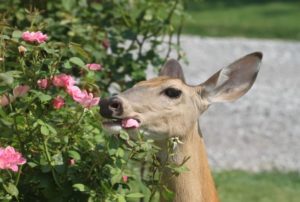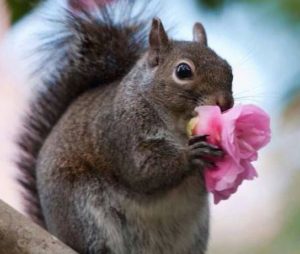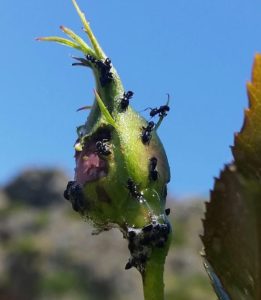What Animals Eat Roses and Other Garden Plants?
Gardening can be a fun and relaxing way to spend your time outdoors. When we garden we also get to enjoy the fruits of our labor. For some this can mean vegetables from their vegetable garden, fruits from their trees, or simple flowers that they have spent many hours cultivating. And there can be little more frustrating when you have found your hard work destroyed by an animal that invaded your territory and ate your roses. So what animals eat roses and other garden plants?
Some major mammalian rose-eaters include deer, rabbits, and gophers. Some parts of the world can even have wild goats, feral pigs, or rabbits to contend with. In this article we are going to talk about the 3 main offenders in the western world: deer, squirrels, and insects.
What Animal is Eating my Roses?
Humans aren’t the only mammals who adore roses. Roses are a favorite of deer. It may be the smell that attracts deer but they don’t stop to just smell the roses. They will spend just enough time in your yard to to eat rosebushes down to only twiggy stubs.
Deer Eat Roses
In spite of their size, deer might be hard to identify when they’re moving in on your rosebushes during the evening. They are unbelievably silent and can be found in most places (think urban) that they shouldn’t be.
Look for deer tracks or deer droppings to be sure that mule deer, whitetail deer, or even backtail deer are your culprits. If you live near a wooded, open, or even high desert area there is a good chance that deer are eating your roses.
How To Stop Deer From Eating Your Roses
There’s not much you can do to protect your garden from deer besides fencing in your property. And even sometime that isn’t successful. There are reports on the internet of some that have had success with deer repellent. But in my mind the jury is still out on that form of keeping the deer from your plants.
One great combination of both noise and physical shock is using a motion activated sprinkler in your yard. There are hose-connected models for gardening areas close to the house (within reach of a hose), and reservoir models that work from a tank that you can place further out. You can also buy hose connectors to extent your hoses since the tank models may need to be filled each day for high traffic areas.
Squirrels Eat Roses
 Squirrels could be to also be to blame. Bonnieplants gives the signs of squirrel activity:
Squirrels could be to also be to blame. Bonnieplants gives the signs of squirrel activity:
Shallow digging spots in planting beds. These sites aren’t large—you’re looking for golf ball-size or smaller holes. Freshly planted seedbeds are a big squirrel target, as they enjoy unearthing and eating the seeds.
Bite marks and/or missing fruit. Squirrels sometimes eat part of a tomato and leave the rest behind; other times, they eat the entire fruit. Other squirrel favorites include beans, squash, cucumbers, and eggplants.
Missing plants. You might find remnants of seedlings lying on the soil, or they may completely disappear. Ditto for leaves of perennials.
Nibbled seedheads. Squirrels nibble flat, ripening seedheads from the outside edges in, and are especially drawn to sunflowers.
Container digging. If your pots of veggies, herbs, and flowers are constantly being dug into, that’s likely a squirrel’s nut-hiding handiwork (although chipmunks do the same thing). Occasionally squirrels will unearth young potted plants in their quest to bury nuts.
Partially eaten flowers. Squirrels seem to be fond of daisy blooms, but sometimes eat other flowers, too. Half-eaten daisies, with half the petals and most of the center disk missing, are a pretty good clue that squirrels are feasting in your garden.
What To Do With Squirrels Eating Your Plants
The real trouble with squirrels feeding on your plants is that when they are full they start taking the food to the flower beds and burring them. (Digging up your flower beds). Then, they go back and dig them up later.
Squirrels are a pain but there are things like Squirrel B Gone that help. Other ideas include using cheap sunflowers and having leave piles as far away from my gardens as possible. Squirrels will also dig down six inches and loot your bulbs. Making a mix with cayenne pepper with it and spraying it on the plants does help too.
There are many gardeners that don’t want to trap squirrels so they simply feed them with a squirrel feeder. This will keep the squirrels away from many of the plants in your yard you care about.
What is Eating my Rose Leaves?
There are many types of insects that eat will eat your roses, like aphids and spittle bugs, and also invertabrates like slugs and snails prefer them as well. The most common bugs that eat roses are Spider Mites, Rose Bud Borers, Rose Chafers ,Rose Chafers, Leafcutter Bees or Japanese Beetles.
What is eating my roses at night?
Chances are if you notice less roses in the morning than you had the night before your culprit are deer. Deer really aren’t nocturnal. Deer are crepuscular, which means they are very active in the twilight hours (both morning and night). This doesn’t mean that deer can’t come and eat your roses in the middle of the night, because that certainly happens.
And it might not matter when exactly when in the night or twilight your roses are getting eaten. The fact is that they are disappearing in the night and deer are most likely eating them.
How do you kill aphids on roses? How do you kill aphids on plants?
Clemson.edu has a great chart on the type of pesticide that should be used for  roses. Aphids can also be hosed off with a strong stream of water directed above and below the leaves. Spraying with water should be repeated frequently as needed, focusing in particular on new growth. Roses can also be sprayed with insecticidal soap to control aphids. Insecticidal soap must be sprayed onto the aphids to be effective. Repeat spray three times at 5-7 day intervals. Higher toxicity insecticides are available. However, it is important to note that aphids are very difficult to control because they multiply so rapidly. Leaving even one aphid alive can result in a large population very quickly. In addition, these insecticides kill the natural enemies of rose aphids.
roses. Aphids can also be hosed off with a strong stream of water directed above and below the leaves. Spraying with water should be repeated frequently as needed, focusing in particular on new growth. Roses can also be sprayed with insecticidal soap to control aphids. Insecticidal soap must be sprayed onto the aphids to be effective. Repeat spray three times at 5-7 day intervals. Higher toxicity insecticides are available. However, it is important to note that aphids are very difficult to control because they multiply so rapidly. Leaving even one aphid alive can result in a large population very quickly. In addition, these insecticides kill the natural enemies of rose aphids.
What is a Rose Slug?
Rose slugs are the larvae (immature forms) of sawflies, non-stinging members of the wasp family. Three species of sawflies, the roseslug (Endelomyia aethiops), bristly roseslug (Cladius difformis), and curled rose sawfly (Allantus cinctus), are pests of roses. The larvae of some sawfly species are hairy and often mistaken for caterpillars. Others appear wet and shiny, superficially resembling slugs. The larvae generally reach about ½-to-¾ inch in length.
 Generally rose slugs feed at night. Depending on the species, young rose slugs feed on the upper or lower surfaces of leaves between veins, leaving a ‘window’ of translucent tissue that turns brown. As some species of rose slugs get larger, they chew large holes or the entire leaf with only the midrib remaining. Regular inspection of roses is important because feeding typically progresses quickly and extensive leaf skeletonizing can occur if infestations are not noticed. In addition, with their coloring, they can be very difficult to spot on leaves.
Generally rose slugs feed at night. Depending on the species, young rose slugs feed on the upper or lower surfaces of leaves between veins, leaving a ‘window’ of translucent tissue that turns brown. As some species of rose slugs get larger, they chew large holes or the entire leaf with only the midrib remaining. Regular inspection of roses is important because feeding typically progresses quickly and extensive leaf skeletonizing can occur if infestations are not noticed. In addition, with their coloring, they can be very difficult to spot on leaves.
Control: Rose slugs can be controlled by handpicking. They can also be removed by spraying with water. Once dislodged, they cannot climb back onto the plant. Insecticidal soap and horticultural oil are also effective against rose slugs. Sprays should thoroughly cover both upper and lower leaf surfaces. Soil drenches or granular applications of dinotefuran or imidacloprid will control sawfly larvae. Bacillus thuringiensis will only control true caterpillars and not the larvae of sawflies. See Table 1 for examples of brands and products.
What is a Horticultural Oil?
Horticultural Oils or Narrow Range Oils are lightweight oils, either petroleum or vegetable based. They are used in both horticulture and agriculture, where they are applied as a dilute spray on plant surfaces to control insects and mites.
The oils provide control by smothering the target pests, and are only effective if applied directly to the pest, and provide no residual controls.
Oils are generally considered suitable for ‘organic pest control’, with most oils permitted under the U.S. National Organic Program.
Seems like it’s always bugs that eat my roses. At least they leave parts of the flower